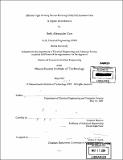Efficient light emitting devices utilizing CdSe(ZnS) quantum dots in organic host matrices
Author(s)
Coe-Sullivan, Seth (Seth Alexander)
DownloadFull printable version (4.158Mb)
Alternative title
Efficient LEDs utilizing CdSe(ZnS) quantum dots in organic host matrices
Other Contributors
Massachusetts Institute of Technology. Dept. of Electrical Engineering and Computer Science.
Advisor
Vladimir Bulovic.
Terms of use
Metadata
Show full item recordAbstract
We demonstrate efficient electroluminescence from thin film structures containing core-shell CdSe(ZnS) quantum dots dispersed in molecular organic host materials. In the most efficient devices, excitons are created on the quantum dot sites via energy transfer from organic host molecules, and direct charge injection into the quantum dots is minimized. For quantum dots with core diameter 38 [Angstroms], the electroluminescence spectra peak at 562nm and have full width at half maximum as narrow as 32nm. Saturated color devices have external quantum efficiencies as high as 0.61% at the current density of 7mA/cm². At 125mA/cm², the device luminance is 1900cd/m², which corresponds to a luminescence efficiency of 1.5 cd/A. The yield over hundreds of devices is greater than 90%, indicating a robust material system.
Description
Thesis (S.M.)--Massachusetts Institute of Technology, Dept. of Electrical Engineering and Computer Science, 2002. Includes bibliographical references (leaves 29-32).
Date issued
2002Department
Massachusetts Institute of Technology. Department of Electrical Engineering and Computer SciencePublisher
Massachusetts Institute of Technology
Keywords
Electrical Engineering and Computer Science.